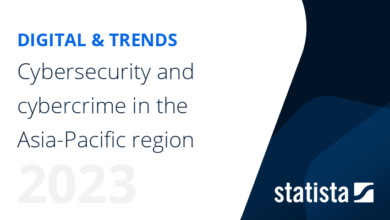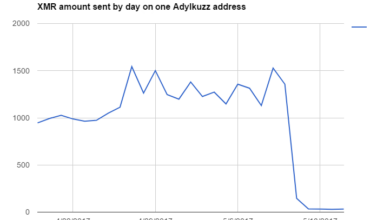
Britain Is Extremely Vulnerable to Category One Cyber Attacks
Britain is extremely vulnerable to category one cyber attacks – a chilling reality that demands our attention. This isn’t some far-fetched sci-fi scenario; it’s a present danger, a ticking time bomb threatening our national infrastructure, economy, and even our personal safety. From our interconnected power grids to our financial systems and healthcare networks, the potential for catastrophic damage is immense.
This post delves into the specifics of this vulnerability, exploring the weaknesses, the threats, and what we can do to protect ourselves.
We’ll examine the critical infrastructure vulnerabilities that leave Britain exposed, detailing the specific weaknesses in sectors like energy, transportation, and healthcare. We’ll also discuss the frightening potential for cascading failures – a breach in one area triggering a domino effect across the entire system. The role of human error and social engineering will be explored, alongside the emerging threats posed by AI and other cutting-edge technologies.
Finally, we’ll look at the crucial role of international cooperation and intelligence sharing in mitigating this risk. It’s a complex issue, but understanding it is the first step towards building a stronger, more resilient Britain.
Critical Infrastructure Vulnerabilities

Britain’s critical national infrastructure faces significant threats from sophisticated cyberattacks. The interconnected nature of these systems means a successful breach in one area could have devastating ripple effects across the entire network, causing widespread disruption and damage. Understanding these vulnerabilities is crucial for developing effective mitigation strategies.
Specific Vulnerabilities in Critical Infrastructure Sectors
The following table details specific vulnerabilities within key sectors of Britain’s critical national infrastructure and their potential impact.
| Infrastructure Sector | Specific Vulnerability | Potential Impact | Mitigation Strategies |
|---|---|---|---|
| Energy | Outdated Supervisory Control and Data Acquisition (SCADA) systems, lack of robust cybersecurity protocols, reliance on legacy systems vulnerable to exploitation. | Power outages, disruption of energy supply, damage to critical equipment, economic losses, potential for widespread blackouts. | Modernization of SCADA systems, implementation of robust cybersecurity protocols (including intrusion detection and prevention systems), regular security audits and penetration testing, employee cybersecurity training. |
| Transportation | Vulnerabilities in railway signaling systems, reliance on outdated communication networks, lack of comprehensive cybersecurity measures in air traffic control systems. | Disruption of rail services, delays and cancellations, potential for accidents, air traffic control disruptions, ground transportation chaos. | Investment in modern, secure communication systems, implementation of robust cybersecurity measures, regular security assessments, employee training on cybersecurity threats and best practices. |
| Healthcare | Vulnerabilities in electronic health records (EHR) systems, reliance on legacy systems, lack of strong authentication and authorization protocols, phishing attacks targeting medical staff. | Data breaches leading to patient privacy violations, disruption of healthcare services, delays in treatment, compromised patient care, financial losses. | Implementation of robust cybersecurity measures in EHR systems, regular security audits and penetration testing, employee training on phishing and other social engineering attacks, strong password policies, multi-factor authentication. |
| Finance | Vulnerabilities in banking systems, outdated security protocols, reliance on legacy systems, phishing attacks targeting customers and employees, denial-of-service attacks. | Financial losses, disruption of financial services, damage to reputation, potential for fraud, economic instability. | Investment in modern, secure banking systems, implementation of robust cybersecurity protocols, regular security audits and penetration testing, employee training on cybersecurity threats, strong authentication and authorization protocols. |
Cascading Effects of Cyberattacks on Interconnected Infrastructures
The interconnectedness of Britain’s critical infrastructure means a successful cyberattack on one sector could quickly cascade to others. For example:
A successful cyberattack on the energy grid could lead to:
- Widespread power outages affecting transportation systems (trains, traffic lights), leading to delays and disruptions.
- Disruption of healthcare services reliant on electricity, impacting patient care and potentially leading to loss of life.
- Disruption of financial services due to power outages and network connectivity issues, causing economic losses.
- Increased vulnerability to further attacks as other systems struggle to maintain operations.
Real-World Examples of Cyberattacks on Critical Infrastructure, Britain is extremely vulnerable to category one cyber attacks
While specific details of Category 1 attacks are often kept confidential for national security reasons, numerous examples illustrate the potential for widespread disruption. The NotPetya ransomware attack in 2017, though not directly targeting critical infrastructure in the UK, caused significant disruptions globally, highlighting the vulnerability of interconnected systems. Attacks targeting power grids in other countries have resulted in widespread blackouts, demonstrating the potential for similar incidents in the UK.
The impact of such events on the economy, public health, and national security would be profound.
Governmental and Cybersecurity Defenses
Britain’s national cybersecurity defenses are a complex interplay of governmental agencies, private sector initiatives, and international collaborations. While significant strides have been made in recent years, the nation remains vulnerable to sophisticated Category 1 cyberattacks, particularly those targeting critical national infrastructure. The effectiveness of these defenses hinges on several factors, including resource allocation, intelligence sharing, and the adaptability of the systems themselves to evolving threats.
A multi-layered approach is essential, encompassing proactive threat hunting, robust incident response capabilities, and a culture of cybersecurity awareness across all sectors.The current state of Britain’s cybersecurity defenses is a mixed bag. The National Cyber Security Centre (NCSC), a part of GCHQ, plays a crucial role in coordinating national efforts, providing guidance to organizations, and responding to major incidents.
However, the sheer scale and complexity of the cyber threat landscape, coupled with resource constraints, present ongoing challenges. Furthermore, the increasing sophistication of attacks, often involving state-sponsored actors, necessitates a continuous evolution of defensive strategies. The reliance on outdated technologies in certain critical infrastructure sectors also represents a significant vulnerability.
Weaknesses in Existing Cybersecurity Strategies and Proposed Improvements
The following table Artikels key weaknesses in Britain’s cybersecurity strategies, their impact, proposed solutions, and the challenges associated with implementation.
| Weakness | Impact | Proposed Solution | Implementation Challenges |
|---|---|---|---|
| Insufficient funding for cybersecurity initiatives across all sectors (public and private). | Reduced capability to detect, prevent, and respond to sophisticated attacks; increased vulnerability of critical infrastructure. | Increased government funding, coupled with tax incentives for private sector investment in cybersecurity. | Securing sufficient budgetary allocation; balancing competing priorities within government spending; ensuring effective oversight of funding distribution. |
| Skills shortage in the cybersecurity workforce. | Difficulty in recruiting and retaining skilled professionals; inadequate staffing levels in key organizations. | Investment in cybersecurity education and training programs; initiatives to attract and retain talent; international collaboration to address the global skills gap. | Competition for talent with other sectors; lengthy training periods; ensuring training programs are aligned with industry needs. |
| Lack of standardized cybersecurity protocols across critical infrastructure sectors. | Inconsistent levels of security across different sectors; increased risk of cascading failures. | Mandatory cybersecurity standards and regulations for critical infrastructure operators; development of a common cybersecurity framework. | Resistance from some sectors; balancing security requirements with operational efficiency; ensuring compliance without stifling innovation. |
| Slow adoption of new technologies and practices. | Increased vulnerability to emerging threats; inability to leverage the latest security solutions. | Government-led initiatives to promote the adoption of new technologies; investment in research and development; incentives for early adoption. | Cost of upgrading systems; integration challenges; resistance to change within organizations. |
Comparison of Britain’s Cybersecurity Defenses with Other Developed Nations
Britain’s cybersecurity defenses can be compared to those of other developed nations like the United States, Israel, and other EU members. While the UK boasts a strong intelligence capability and a well-regarded NCSC, the US benefits from a larger economy and greater private sector investment in cybersecurity. Israel, known for its robust cybersecurity industry, has a different threat landscape and focuses heavily on proactive defense strategies.
The EU, with its focus on data protection and cross-border collaboration, offers a different model. Britain’s strengths lie in its intelligence gathering and its collaborative approach with international partners, while its weaknesses include resource constraints and the challenge of coordinating efforts across multiple sectors. The continuous evolution of cyber threats necessitates a dynamic approach to national cybersecurity, adapting to new challenges and leveraging international best practices.
The Role of Human Error and Social Engineering
Britain’s vulnerability to Category 1 cyberattacks isn’t solely down to sophisticated hacking techniques; a significant factor is the human element. Human error, coupled with the effectiveness of social engineering tactics, creates a potent combination that leaves critical infrastructure and governmental systems exposed. This vulnerability stems from the inherent fallibility of individuals and their susceptibility to manipulation.Human error encompasses a wide range of actions, from accidentally clicking a malicious link in a phishing email to failing to update software with crucial security patches.
Social engineering, on the other hand, leverages psychological manipulation to trick individuals into divulging sensitive information or performing actions that compromise security. The convergence of these two factors dramatically increases the likelihood of successful cyberattacks, especially those targeting high-value assets.
Mitigation of Human Error Through Cybersecurity Training
A robust training program is crucial for reducing the risk of human error in cybersecurity. This program should be comprehensive, engaging, and regularly updated to reflect evolving threats.A well-structured training program should include the following key modules:
- Security Awareness Training: This module focuses on educating employees about common cyber threats, such as phishing, malware, and social engineering tactics. It should include real-world examples and interactive scenarios to enhance engagement and knowledge retention.
- Password Management and Authentication: This module emphasizes the importance of strong, unique passwords and the use of multi-factor authentication. It should cover best practices for password creation and storage, and the dangers of password reuse.
- Safe Email Practices: This module teaches employees how to identify and avoid phishing emails and other malicious communications. It should cover techniques for verifying email authenticity and handling suspicious attachments or links.
- Data Security and Handling: This module covers proper procedures for handling sensitive data, including data encryption, access control, and data loss prevention. It should highlight the consequences of data breaches and the importance of adhering to security policies.
- Incident Response: This module equips employees with the knowledge and skills to respond effectively to security incidents. It should cover procedures for reporting security breaches and following established protocols.
Examples of Successful Social Engineering Attacks in Britain
Several high-profile social engineering attacks have targeted British organizations and individuals, highlighting the effectiveness of these tactics. While specific details of many attacks are kept confidential for security reasons, the general methods used often involve:* Phishing campaigns: Emails designed to mimic legitimate communications from banks, government agencies, or other trusted entities are used to trick individuals into revealing login credentials or other sensitive information.
For example, a highly publicized case involved a sophisticated phishing campaign targeting employees of a major British bank, resulting in a significant financial loss.
Pretexting
Attackers create a believable scenario to gain access to information or systems. This could involve posing as a technical support representative to obtain remote access to a computer or pretending to be a colleague to gain access to confidential files.
Baiting
Attackers use tempting offers or incentives to lure victims into clicking malicious links or downloading infected files. For example, an attacker might offer a free software download that contains malware.
Quid pro quo
Attackers offer a service or favour in exchange for sensitive information. This might involve offering to fix a computer problem in exchange for remote access credentials.
Emerging Threats and Technologies: Britain Is Extremely Vulnerable To Category One Cyber Attacks
Britain’s already precarious cybersecurity landscape is constantly evolving, with new threats and technologies emerging at an alarming rate. Understanding these emerging risks is crucial for bolstering national defenses and mitigating potential damage to critical infrastructure and national security. This section will explore some of the most significant challenges on the horizon.The convergence of sophisticated cyberattacks and rapidly advancing technologies creates a complex threat environment.
The increasing reliance on interconnected systems, the Internet of Things (IoT), and cloud computing expands the attack surface, making it harder to defend against sophisticated intrusions. Furthermore, the blurring lines between the physical and digital worlds – through technologies like industrial control systems (ICS) – presents unique vulnerabilities that require a multi-faceted approach to cybersecurity.
Artificial Intelligence and Machine Learning in Cybersecurity
AI and ML are transforming both offensive and defensive cybersecurity capabilities. On the offensive side, AI can automate the discovery of vulnerabilities, personalize phishing attacks, and generate highly realistic deepfakes for social engineering campaigns. For example, AI-powered malware can adapt and evolve, making it more difficult to detect and neutralize. On the defensive side, AI can enhance threat detection, automate incident response, and improve the accuracy of vulnerability assessments.
However, the use of AI in defense is still nascent, and there’s a significant skills gap in developing and deploying these technologies effectively. The potential for AI-driven arms races in the cyber realm is a serious concern.
Advanced Persistent Threats (APTs) and Nation-State Actors
Highly sophisticated and well-resourced APTs, often associated with nation-state actors, pose a significant threat to Britain’s critical infrastructure and national security. These groups employ advanced techniques, such as zero-day exploits and polymorphic malware, to maintain persistent access to targeted systems. Their operations are often characterized by long-term campaigns focused on intelligence gathering, data theft, and sabotage. For instance, the NotPetya ransomware attack, while not directly attributed to a specific nation-state, highlighted the devastating potential of widespread cyberattacks on global infrastructure.
Understanding the tactics, techniques, and procedures (TTPs) of these actors is crucial for developing effective countermeasures.
Britain’s facing a serious threat: we’re incredibly vulnerable to devastating Category One cyberattacks. This highlights the urgent need for robust security measures, and solutions like those discussed in this article on bitglass and the rise of cloud security posture management are becoming increasingly crucial. Without significant improvements in our cybersecurity infrastructure, the UK remains a prime target for sophisticated attacks.
The Evolving Threat Landscape: A Visual Representation
Imagine a dynamic, multi-layered diagram. At the center is a representation of Britain, symbolized by key infrastructure nodes (power grids, financial institutions, government buildings) interconnected by digital lines representing network communications. Surrounding Britain are concentric circles representing escalating threat levels. The innermost circle depicts common cybercrime (phishing, ransomware). The next circle represents more advanced threats like APTs, employing AI-powered tools.
The outermost circle shows potential catastrophic events stemming from large-scale cyberattacks targeting multiple critical infrastructure sectors simultaneously. Key players are represented by different colored icons: red for malicious actors (nation-states, criminal organizations, hacktivists), blue for defensive entities (government agencies, cybersecurity firms), and green for proactive measures (national cybersecurity strategies, international cooperation). The size of the icons reflects their relative capabilities and influence.
Britain’s critical infrastructure is alarmingly vulnerable to sophisticated cyberattacks, leaving us dangerously exposed. Strengthening our defenses requires innovative solutions, and that’s where advancements like those discussed in this article on domino app dev the low code and pro code future become crucial. Faster, more secure application development is key to patching vulnerabilities and bolstering our overall cyber resilience against these category one threats.
We need to act now to mitigate the risk.
The diagram illustrates the increasing complexity and interconnectedness of the threats, highlighting Britain’s vulnerability to cascading failures if a major attack were to succeed. The diagram emphasizes the need for proactive and multi-layered defense strategies to counter these emerging threats.
International Cooperation and Intelligence Sharing

Britain’s vulnerability to sophisticated cyberattacks necessitates a robust international approach. Effective mitigation requires not only strong domestic defenses but also a collaborative network sharing threat intelligence and coordinating responses. The interconnected nature of cyberspace means that a cyberattack originating in one country can quickly impact others, highlighting the urgent need for global cooperation.The sharing of cyber threat intelligence is paramount.
Early warnings about emerging threats, attack techniques, and malicious actors allow for proactive defense strategies. This collaborative approach is far more effective than isolated national efforts, enabling quicker identification and neutralization of threats before they can cause significant damage. Furthermore, collective action allows for the development of shared best practices and standards, strengthening overall cybersecurity posture.
Mechanisms for International Cybersecurity Collaboration
Several mechanisms facilitate collaboration between Britain and its allies. Formal alliances, such as NATO’s Cooperative Cyber Defence Centre of Excellence (CCDCOE), provide a platform for information sharing, joint exercises, and the development of common strategies. Bilateral agreements between nations allow for direct intelligence exchange and coordinated responses to specific threats. Multilateral initiatives, involving groups of nations, contribute to the establishment of international norms and standards for responsible state behavior in cyberspace.
These collaborative efforts involve the exchange of threat intelligence, the development of joint cybersecurity strategies, and coordinated responses to cyber incidents. For example, the Five Eyes intelligence alliance (US, UK, Canada, Australia, and New Zealand) facilitates a high level of intelligence sharing and collaborative response to cyber threats.
Comparison of International Cybersecurity Cooperation Models
Different models of international cybersecurity cooperation exist, each with its strengths and weaknesses. Bilateral agreements offer focused collaboration, but may lack the breadth of a multilateral approach. Multilateral frameworks, such as the UN’s Group of Governmental Experts (GGE) on cybersecurity, aim for broader consensus but can be hampered by differing national interests and priorities. The most effective approaches often involve a combination of these models, leveraging the strengths of each while mitigating their weaknesses.
For example, a nation might have a strong bilateral agreement with a close ally while also participating in multilateral forums to establish broader international norms. The effectiveness of any model depends on the level of trust, transparency, and commitment from participating nations. A successful model requires a balance between the need for information sharing and the protection of sensitive national security information.
The establishment of clear protocols and trust-building measures are crucial for effective collaboration.
Last Word

The vulnerability of Britain to Category 1 cyberattacks is a serious and multifaceted problem. While the challenges are significant, the solutions are not insurmountable. Strengthening our national cybersecurity defenses, improving employee training, fostering international collaboration, and proactively addressing emerging threats are all crucial steps. The stakes are high, but by understanding the risks and working together, we can significantly reduce our vulnerability and safeguard our nation’s critical infrastructure and digital future.
The fight for online security is an ongoing battle, but one we must win.
FAQ Resource
What is a Category 1 cyberattack?
A Category 1 cyberattack is a highly sophisticated and impactful attack that can cause widespread disruption and significant damage to critical national infrastructure.
How does social engineering contribute to cyber vulnerabilities?
Social engineering exploits human psychology to trick individuals into revealing sensitive information or performing actions that compromise security.
What role does international cooperation play in cybersecurity?
International cooperation is crucial for sharing intelligence, developing best practices, and coordinating responses to transnational cyber threats.
Are there specific laws in place to address cyberattacks in the UK?
Yes, the UK has various laws and regulations designed to address cybercrime and protect critical national infrastructure, including the Computer Misuse Act 1990 and the National Cyber Security Centre’s guidance.
What are some simple steps individuals can take to improve their online security?
Use strong passwords, enable two-factor authentication, be wary of phishing emails, and keep software updated.





